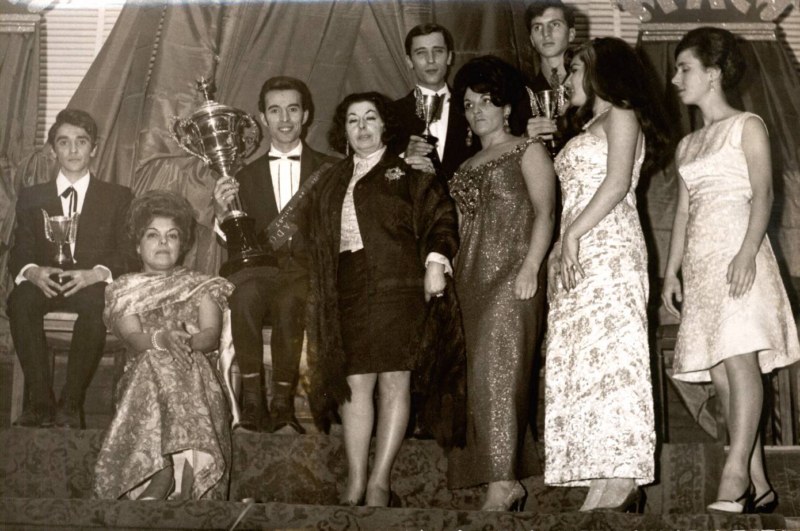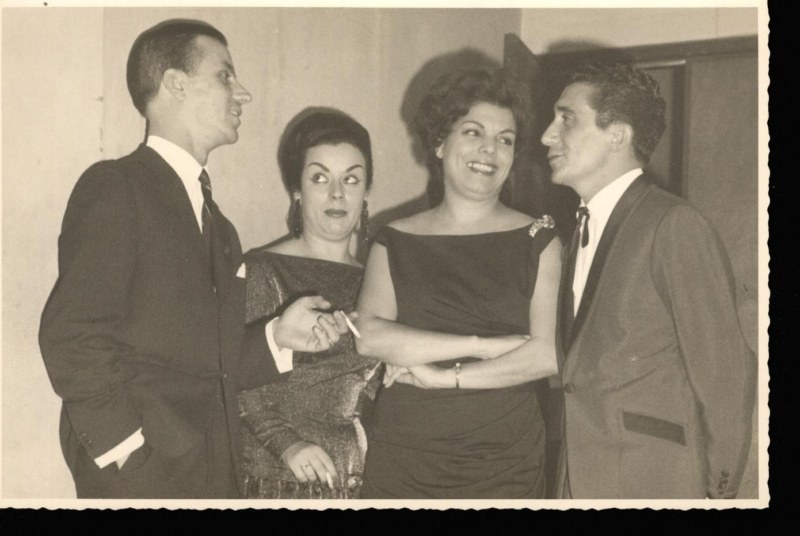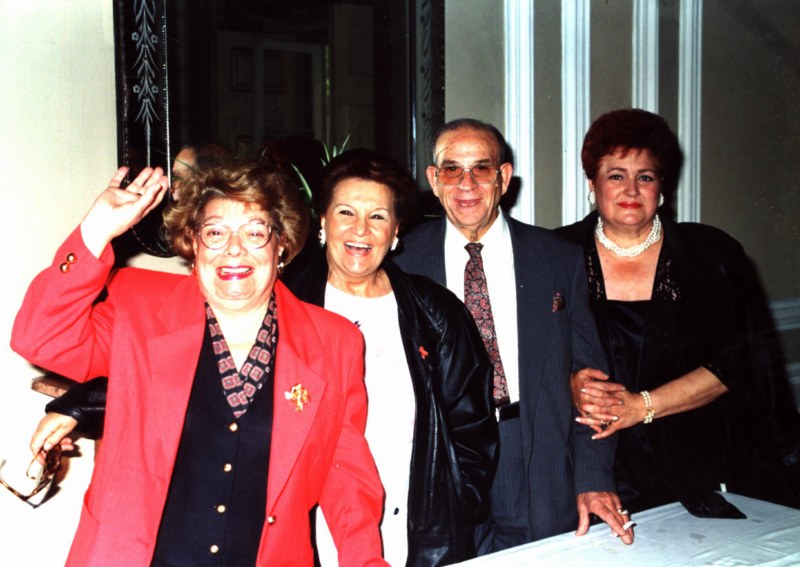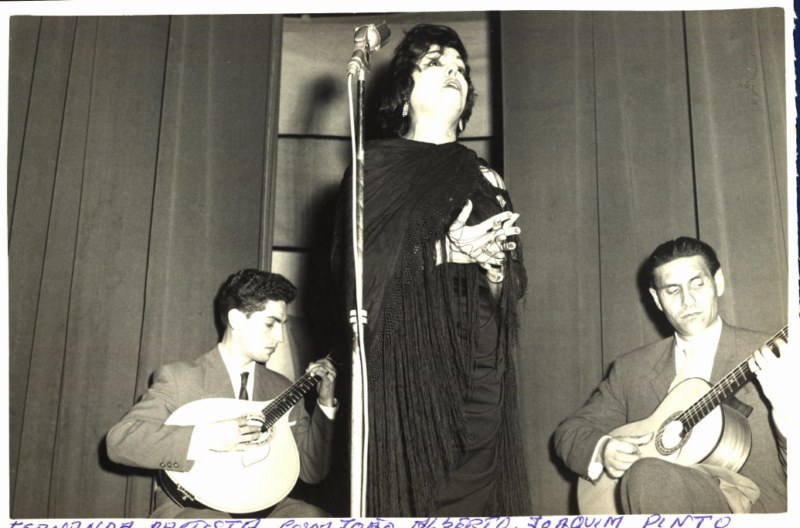Know more:
Fernanda Baptista
(N. 7 May, 1919 - M. 25 July, 2008)Fernanda Baptista was born on May 7, 1919; at her family’s house on Travessa do Oleiro 11, in Lisbon.
The actor Vasco Santana was her neighbour. As a child she loved to sing and he used to call her singing parrot (“o papagaio das cantorias”). At age 10 she entered a children’s play, but her artistic career was still far away.
At 19 she married a Companhia Colonial de Navegação clerk and started to work as a seamstress at Casa Pinto de Almeida on Rua Augusta. And it is precisely at this workshop and in her client’s private parties that she stands out singing the Fado.
In 1945 her co-workers enter her name for the Concurso de Outono by “Canção do Sul”, whose eliminating tests take place at Retiro dos Marialvas and Café Latino. She won the 2nd place on representation of Bairro Alto. She was hired by the producer José Miguel and joined professionally the cast of Retiro dos Marialvas.
Her genuine interpretations were highly praised by the fado critics and less than a year after her professionalization the newspaper “Guitarra de Portugal” wrote that Fernanda Baptista was “one of the most solid values of the modern generation” (“Guitarra de Portugal”, July 30, 1945).
In 1946 she sings at Café Luso and the producers Rosa Mateus and Lourenço Rodrigues invite her to join the cast of Teatro Maria Vitória replacing Luisa Satanela in the Portuguese vaudeville play (Teatro de Revista) "Banhos de Sol" interpreting “Ronda Fadista”.
Until the end of the decade she will appear in several musical sketches at Teatro Maria Vitória, namely “Canções Unidas” in 1946 with the theme “Trapeiras de Lisboa”, awarded by SNI as the “Melhor Quadro de Revista”; “Ó ai ó linda” and “Salada de Alface”, in 1947; “Disto é que eu gosto” and “O Tico-tico” in 1948. In this play she sings her greatest hit “Fado da Carta”, by João Nobre and Amadeu do Vale.
Between 1953 and 1955 with the Eugénio Salvador Company at Teatro Maria Vitória, Fernanda Baptista appeared in the plays “Saias Curtas”, “Cala o Bico”, and “Festa é Festa”.
She also played in “Ena Já Fala” at Teatro ABC in 1969 interpreting one of her most famous fados, the “Saudades de Júlia Mendes”.
Simultaneously to her appearances in shows and tours in Portugal and with the Portuguese communities abroad, Fernanda Baptista built a solid career as a fado singer in Portuguese vaudeville theatre plays up until 1974.
Fernanda Baptista also starred in the feature film “Sol e Toiros” directed by José Buchs in 1949. The cast included Manuel dos Santos, Leonor Maia, Amália Rodrigues, and Eugénio Salvador, among others. The “Fado Toureiro” from the film’s soundtrack will become one of the singer’s most famous songs, along with the above-mentioned “Fado da Carta” and “Saudades de Júlia Mendes”.
She did the first of her many tours in the 1950s to Africa with the play “Saias Curtas”, and shows in various cities, as Luanda, Lobito, Nova Lisboa, and many others.
Later Fernanda Baptista will often travel to Brazil – where she once stayed for a year and a half -, Argentina, Africa, United States, and Canada. She did over 17 tours in these two North American countries.
She also did special appearances in several TV shows, as “Zip Zip” or “Fado Fadinho”, and was recently guest artist at Filipe la Féria’s “Grande Noite” and “Cabaret”.
Fernanda Baptista made her comeback to the Portuguese vaudeville theatre (Teatro de Revista) in 1990 with the play “Ai Cavaquinho” at Teatro Capitólio on Parque Mayer. In 1994, also at Parque Mayer at Teatro Variedades, she was honoured during the presentation of the play “Vivó Velho”, the last play she did co-starring with Artur Garcia, Mariette Pessanha, and Joel Branco.
On April 29, 1996, a celebration of her career’s 50th anniversary was held at Teatro São Luís, with the participation of Anita Guerreiro, Deolinda Rodrigues, Maria Valejo, Maria José Valério, Fernando Maurício or Carlos Zel who, among many other colleagues and friends from the fado and the teatro de revista, showed their affection and admiration for the artist.
Fernanda Baptista recorded extensively but it was only in the 1970s that her first LP was released. In 2005 Movieplay released the anthology “Fernanda Baptista – a Maior Voz do Teatro de Revista”, a double CD featuring her greatest hits. All songs were re-mastered from her recordings between 1967 and 1981.
Despite having stepped away from the stages very often and having considering retiring for good, on her 87th birthday - in May 2006 – she was part was the cast of the musical play “A Canção de Lisboa”, by Filipe la Féria, at Teatro Politeama.
She died on July 25, 2008.
In 2003, the then President of the Republic Jorge Sampaio awarded her the Grau de Comendadora da Ordem de Mérito.
Source:
“Canção do Sul”, February 16, 1945;
“Canção do Sul”, May 16, 1945;
“Guitarra de Portugal”, July 30, 1945;
“Canção do Sul”, November 1, 1946;
“Canção do Sul”, August 15, 1947;
“Correio da Manhã”, March 23, 1994;
“O comércio do Porto”, May 5, 1996;

Fernanda Baptista, Tristão da Silva Junior, António Rocha, Hermínia Silva. Coroação dos Reis da Rádio e da TV, Pavilhão dos Desportos, 1967

Fernando Farinha, Fernanda Maria, Fernanda Baptista, Tony de Matos. Festa de Tony de Matos, Cinema Império, 1962

Fernanda Baptista, Deolinda Rodrigues, Pepe Cardinal, Anita Guerreiro 1995

João Alberto, Fernanda Baptista e Joaquim Pinto, s/d.
-
Fado da Carta Fernanda Baptista (João Nobre / Amadeu do Vale)